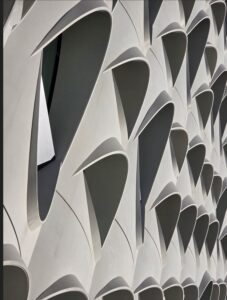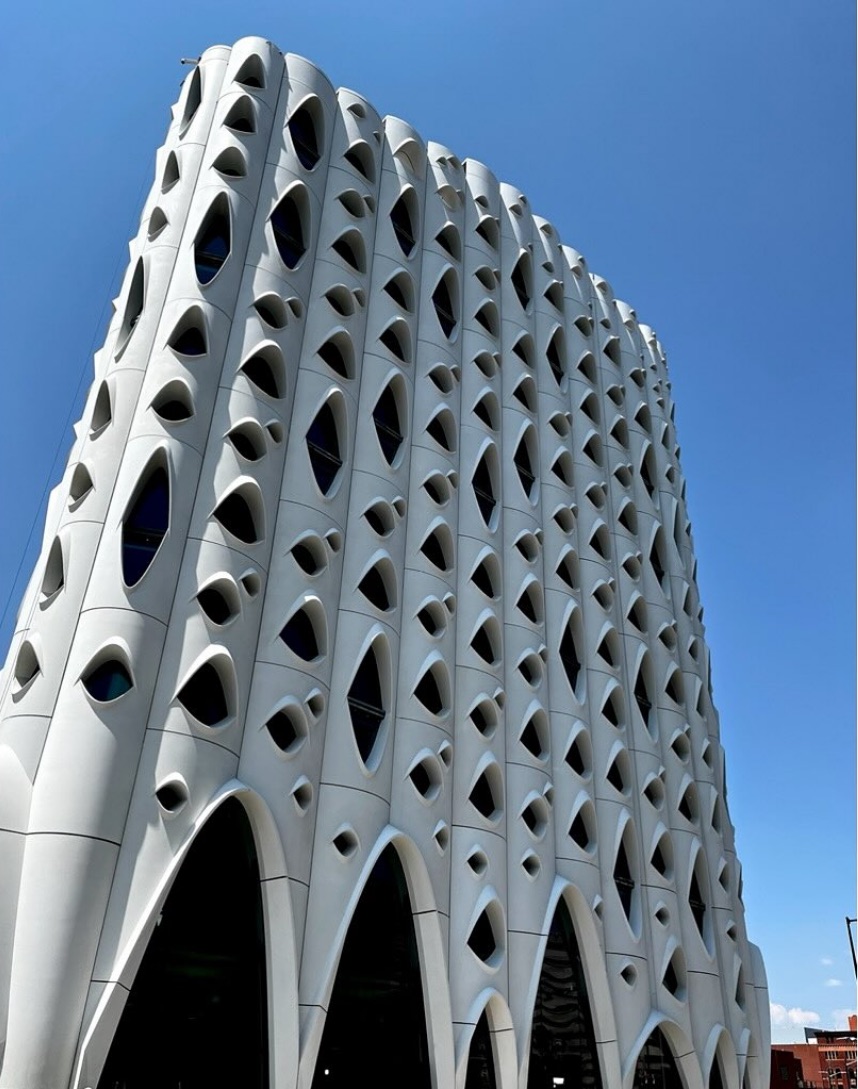At Optima®, our commitment to sustainability and innovative architecture drives us to spotlight groundbreaking developments that align with our values. The recently opened Populus Hotel in Denver stands as a testament to what’s possible when design meets environmental responsibility.
Populus is a 265-room hotel that opened in late 2024 and is being hailed as the first carbon-positive hotel in the United States. In practice, “carbon positive” means Populus will sequester more carbon dioxide than the combined embodied and operational emissions of the building over its entire lifecycle. The project’s developers, Urban Villages, and architects, Studio Gang, infused a deep environmental ethos into the design – from its aspen tree-inspired facade to its zero-waste operations – to ensure the hotel doesn’t just neutralize its carbon footprint, but actually leaves the planet ‘better than we found it’. According to its creators, Populus plans to overcompensate for its emissions by 400–500% through a mix of low-carbon construction, eco-friendly operations, and an ambitious tree-planting campaign. The hotel even launched a public “Road to Carbon Positive” dashboard to transparently track its carbon metrics (embodied vs. operational emissions and offsets) in real time.
A signature element of Populus’s sustainability plan is its massive tree-planting and reforestation effort, which provides a direct, nature-based carbon sink for the hotel’s emissions:
- Initial Reforestation (Embodied Carbon Offset): To compensate for the one-time carbon cost of construction, Populus’s developer planted over 70,000 trees in Colorado’s forests even before the hotel opened. Specifically, Urban Villages worked with the U.S. Forest Service and partners to reforest 172+ acres in Gunnison County with native Engelmann spruce seedlings. This area was chosen to restore forest devastated by a beetle-kill epidemic, meaning the project not only sequesters carbon but also helps revive a damaged ecosystem. Over their lifetimes, these 70,000 trees are expected to sequester an amount of CO₂ equivalent to Populus’s entire core-and-shell construction emissions. In other words, the building’s embodied carbon is effectively “paid back” as the new forest matures. (Notably, this approach was favored over simply buying offsets because it creates a visible local legacy and biodiversity benefits in Colorado.)

- “One Night, One Tree” – Continuous Offsetting: Populus’s climate impact doesn’t stop at construction. The hotel has an ongoing commitment to plant a tree for every guest night as part of its operations. In 2024 (its opening year), this will result in roughly 20,000 additional trees planted. Looking ahead, Populus aims to plant at least 55,000 trees in 2025 through this program, and continue at pace for each subsequent year. All trees are planted in collaboration with forestry experts to ensure they thrive – for example, in areas of the White River and Grand Mesa national forests that need reforestation after wildfires or pest damage. The species selected (like lodgepole pine, Douglas fir, and spruce) are chosen for climate resilience and ecological appropriateness. As these trees grow, they will absorb tens of thousands of tons of CO₂ over the coming decades, directly counterbalancing the hotel’s operational emissions. Urban Villages emphasizes that this isn’t just offsetting – it’s rebuilding forests. “We’re not just buying carbon credits, we’re reforesting Colorado forests,” said Jon Buerge, the company’s president. The result is a virtuous cycle: the more guests who stay at Populus, the more trees get planted, and the more carbon is pulled out of the atmosphere.
Sustainable Design vs. Traditional Building Practices
Populus stands out by integrating sustainability at every level, often in ways that contrast with traditional hotel development:
- Low-Carbon Materials: Conventional buildings often rely on materials like standard concrete and steel that carry a high carbon footprint. Populus instead opted for innovative low-carbon materials wherever possible. For instance, the use of fly-ash blended concrete (Holcim’s ECOPact) substantially cut concrete-related emissions. The design also incorporates repurposed and natural materials inside: reclaimed wood from Colorado and Wyoming (e.g. wood from old snow fencing) was used for finishes, and even the lobby bar features panels made from MycoWorks Reishi™, a leather-like material grown from mushroom mycelium. By forgoing many “heavy-carbon” materials in favor of greener alternatives, Populus achieved a much lower embodied carbon than a typical project of its size.
- No On-Site Parking Garage: Most urban hotels include multi-level parking garages built with carbon-intensive concrete and steel. Populus took the unusual step of providing zero on-site parking, making it the first new-build hotel in downtown Denver without a parking structure. This decision eliminated a huge source of embodied carbon (and aligns with the hotel’s site being a former gas station they wanted to symbolically transform). Instead of catering to cars, the building was designed to encourage walking, biking, and public transit use by guests. Architect Jeanne Gang “decided not to add street-level parking, but instead activate each of the three sides of the building” for pedestrian engagement. In an automobile-centric city, this is a bold departure – one that reduces emissions from both construction and guest transportation. Traditional hotels rarely sacrifice parking, whereas Populus treats car-free design as key to its sustainability mission.
- Energy Efficiency & Renewables: Populus is built to operate with a minimal carbon footprint, unlike many older buildings. It is equipped with high-performance insulation and window designs (each window has an overhanging “lid” that provides shade and channels rainwater) to reduce heating/cooling loads. All electricity needed is procured from 100% renewable sources, and efficient appliances and systems further cut energy use. In contrast, a traditional hotel might draw power from the grid (often fossil-fueled) and use standard HVAC and lighting, resulting in significant annual CO₂ emissions. By locking in renewables and efficiency from day one, Populus ensures a lower operational carbon baseline than most buildings can achieve.
- Waste Reduction and Circularity: Typical hospitality operations generate large amounts of waste (food waste, single-use plastics, etc.) that end up in landfills, producing methane and other greenhouse gases. Populus addresses this through innovative measures. It installed an on-site biodigester that composts 100% of the hotel’s food waste, turning scraps into soil nutrients that go back to local farms. The hotel also eliminated single-use plastics and provides reusable items (like refillable water bottles) to guests. In partnership with local farms and organizations, Populus practices “table-to-farm” sourcing and composting, creating a circular loop that typical hotels simply don’t have. These steps further shrink the operational carbon footprint (for example, less waste transport and landfill methane) while exemplifying sustainability to guests.
Setting a New Standard
Populus serves as a model for sustainable hospitality, demonstrating that luxury and environmental responsibility can coexist. Its commitment to carbon positivity challenges the industry to rethink traditional practices and embrace innovative solutions for a more sustainable future.
At Optima®, we are inspired by such pioneering projects and remain dedicated to integrating sustainable practices into our communities, ensuring that design excellence and environmental stewardship go hand in hand.

